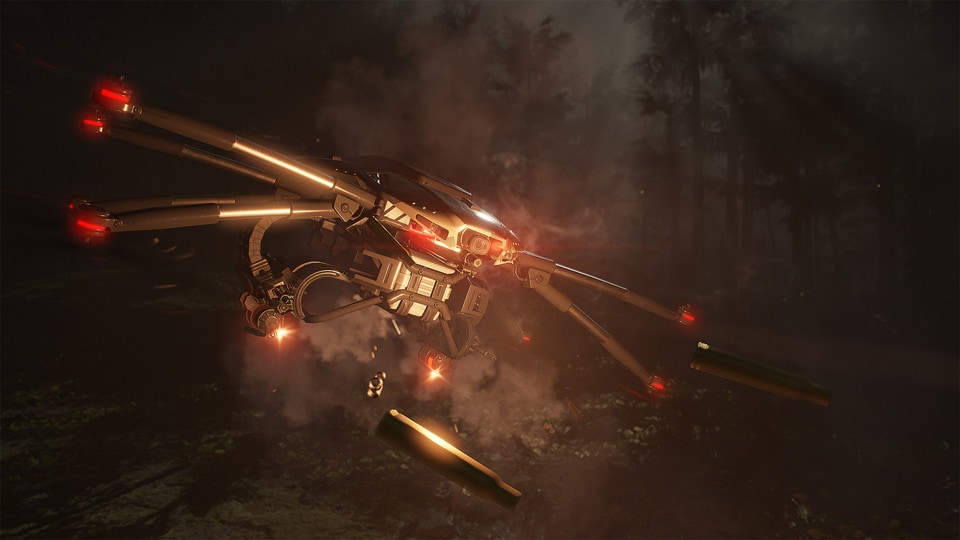Ghost Recon Breakpoint is filled with dangerous enemies, and the deadliest are what the Wolves, the rogue spec-ops unit that now controls the Auroa archipelago, used to seize power: an army of highly versatile, heavily armed military drones that, until recently, were Auroa's main export. Tougher, faster, and more doggedly persistent than any soldier, Breakpoint's drones present a new kind of challenge unlike any the Ghosts have faced. And with their animalistic sounds and extreme maneuverability, they're engineered to be terrifying.

"In Ghost Recon Breakpoint, we're summoning the devil," says Associate Producer Lucas Gissinger, Jr. "We really want players to have that feeling whenever they see a militarized drone. We worked hard to create this animalistic feeling. So when you encounter a drone, you feel that you're no longer the hunter. You're the hunted."
There are more than 20 different drone types in Ghost Recon Breakpoint. All of them have different functions, ranging from benign water-carriers to heavily armored weapons platforms, and many take their names from demons. Stolas quad-rotor drones autonomously patrol wilderness areas, for example, and when they're on the hunt, their abrupt, unpredictable movements and ability to zip around obstacles make them more formidable than they look. Rolling Aym drones accompany the Wolves, and can unleash lethal gunfire and rockets should you catch their attention. The plane-like Azraël watches from the skies, forcing you to go prone and camouflage yourself or risk triggering an alarm when it's near. And the tank-like Behemoths, with their extremely heavy armor and ability to target and attack multiple players at once, present an ideal co-op challenge for any Ghosts brave enough to hunt them down.

Ghost Recon Breakpoint's drones evolved out of a push to bring new enemy archetypes to the series, especially ones that could create challenges for co-op players, says Gissinger. The developers also wanted something that would encourage what Gissinger describes as Ghost Recon's key gameplay aspects: coordination, cooperation, recon, stealth, and the use of tools other than firearms. At the same time, the game still had to be rooted in modern-day reality – and drones, Gissinger says, are very much a part of the defense industry's reality, something the developers learned by consulting with military contractors and attending drone exhibitions.
"They are the perfect soldier," says Gissinger. "They can take more bullets than any other NPC, and last longer on the battlefield. They offer gameplay opportunities to match all the things we want to do with this game. They are grounded in reality, but they are also high-tech enemies that perfectly fit the setting and the lore of Ghost Recon Breakpoint."

Once it was decided that drones fit the game's creative vision, the developers began designing their own, guided by five principles that would allow for varied gameplay:
- Modularity – Each drone's chassis is a basic platform that can be adapted for different situations and tasks. The basic quad-rotor design, for example, can be outfitted with different loadouts and behaviors that dramatically change its purpose. Around bases and settlements, for example, you might encounter non-hostile drones that carry medical supplies (which you can grab), or that hover around watering fields. Out in the wilds, however, you'll likely run across similar-looking drones that carry guns and will aggressively pursue you if you try to run, hide, or even drive away at high speeds.
- Locomotion – Auroa has a lot of diverse terrain, so it's important that Breakpoint's drones be able to operate anywhere, on any terrain, whether they're aerial or ground-based. Part of this is accomplished through advanced AI; aerial drones, for example, can quickly navigate through dense forests and around cover, moving to outflank you while still keeping up the erratic movements that make them hard to hit. To accomplish similar maneuverability with ground drones, Breakpoint's designers fitted them with a tread design inspired by roller-covered Mecanum wheels. This makes them highly maneuverable, able to execute quick turns, rapidly change direction, and strafe sideways, even uphill.
- Detection – To say drones keep a sharp eye out is a gross understatement. Always watchful, and able to react immediately without emotion or hesitation, drones have a visual and sound detection range far beyond what human enemies can sense.
- Attack – The drones are heavily armed, highly advanced AI entities, and can adjust their tactics depending on the number of players they're facing, the number of other drones in the area, their own remaining health, and the environment around them. "We wanted to force the player to adapt their behavior to the drones," Gissinger says
- Realization – It's not enough for drones to be capable enemies; they also need to exude a certain menace so that players understand exactly how much trouble they're in. If a sentry drone hears you, for example, it won't just investigate the area where the sound came from; it'll also noticeably change its behavior, advancing cautiously as its whirs and growls become more threatening. If you're being hunted, you'll know it.
All of these add up to a menagerie of robotic beasts that are more versatile and capable than any of their human handlers – to the point that, if a drone is equipped with more than one weapon, it can use each one on a different player simultaneously, Gissinger says. They're not invincible, however; do enough damage to a heavier drone's armor, for example, and it'll fall away, revealing the glowing, vulnerable machinery beneath. Players who want to test their precision can also target one of the drone's "eyes;" a successful hit will temporarily stun it. (So can an EMP grenade, if you've got one and want to be less precise).

You'll be able to start testing your skills against Auroa's drones when Ghost Recon Breakpoint arrives on PS4, Xbox One, PC, and UPLAY+ on October 4, and on Stadia when the service launches. For more on Ghost Recon Breakpoint, check out our previous coverage.



